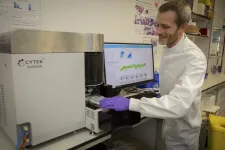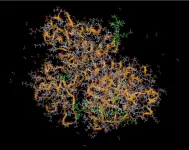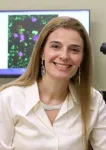(Press-News.org) A new study published today in JAMA Network Open by an international cohort of researchers provides the latest data on the effectiveness of treating pancreatic cancer patients with chemotherapy (with or without radiation therapy) before surgery to remove a tumor. The study focuses specifically on pancreatic adenocarcinoma patients.
The research found that after treatment and surgery, nearly five percent of patients had no detectable cancer cells left in the area where the tumor was, achieving a pathological complete response (pCR).
“PCR means that the cancer has responded extremely well to the treatment, leaving no evidence of cancer in the area examined. Although pCR does not mean someone is cured, patients who have pCR tend to live longer,” said the paper’s senior author Marco Del Chiaro, MD, PhD, division chief of surgical oncology at the CU Cancer Center on the University of Colorado Anschutz Medical Campus.
The study found those with pCR had a 5-year survival rate of 63 percent, whereas those without it had a rate of only 30 percent. This means the survival rate doubles with pCR. These results are helpful to inform patients after surgery, providing information on their prognosis.
“This increase is a big deal for a disease like pancreatic cancer where progress and treatments have gradually improved over the years but is still much lower than other cancers,” adds Del Chiaro.
The paper also goes into detail about the factors that contribute to pCR.
The researchers assessed nearly 1,760 patients with pathology-proven localized pancreatic adenocarcinoma who underwent resection after two or more cycles of chemotherapy (with or without radiotherapy) in 19 centers from eight countries and three continents.
They found several factors associated with achieving pCR, including the specific chemotherapy regimens used before surgery, radiation therapy and the way the cancer responded to treatment based on its anatomy and biology.
“Our ultimate goal is to improve the selection of treatment for patients and enhance prognostic accuracy. We hope this research paper can help oncologists understand the predictors that make patients more likely to achieve pCR, and improve survival, including the biological factors that make a tumor more favorable for surgery,” said first author Thomas Stoop, MD, who works at the Amsterdam University Medical Center and former research fellow at the CU Anschutz Medical Campus in the field of pancreatic cancer surgery.
The findings suggest that tailoring treatment based on these factors could be beneficial. However, they note that these factors might only apply to some patients uniformly. For instance, while one treatment method (SBRT) was associated with achieving pCR, it was not associated with increase in overall survival rate. This highlights the complexity of treatment decisions and the need for further research to validate these findings and understand their broader applicability across different patient populations.
“Although there are a lot of complexities in understanding and improving treatments for pancreatic cancer, I’m hopeful for the future and this study is part of the reason why. Researchers working together worldwide to provide more in-depth data strengthens our ability as doctors and researchers to provide better treatment plans and breakthroughs to help our patients,” said Del Chiaro.
About the University of Colorado Anschutz Medical Campus
The University of Colorado Anschutz Medical Campus is a world-class medical destination at the forefront of transformative science, medicine, education and patient care. The campus encompasses the University of Colorado health professional schools, more than 60 centers and institutes, and two nationally ranked independent hospitals - UCHealth University of Colorado Hospital and Children's Hospital Colorado – which see more than 2 million adult and pediatric patient visits yearly. Innovative, interconnected and highly collaborative, the University of Colorado Anschutz Medical Campus delivers life-changing treatments, patient care and professional training and conducts world-renowned research fueled by $705 million in research grants. For more information, visit www.cuanschutz.edu.
END
New global research aims to improve survival rates for pancreatic cancer patients
Research led by the University of Colorado Cancer Center and Amsterdam University Medical Center provides an in-depth analysis of pathological complete response and its impact on overall survival
2024-06-18
ELSE PRESS RELEASES FROM THIS DATE:
Medication treatment for opioid use disorder offered at only a third of outpatient mental health facilities
2024-06-18
Only a third of outpatient community mental health treatment facilities in 20 states with the highest opioid related overdose deaths report offering medication treatment for opioid use disorders, suggesting efforts may be needed to strengthen such services, according to a new RAND study.
Among the 450 clinics surveyed, factors that increased the likelihood that clinics would provide medication for opioid use disorders included being a certified behavioral health clinic and providing integrated mental and substance use disorder treatment.
Researchers found that most clinics that did not offer medication treatment said they referred patients to other clinics for ...
Salk scientist Jesse Dixon named 2024 Pew Biomedical Scholar
2024-06-18
LA JOLLA (June 18, 2024)—Salk Institute Assistant Professor Jesse Dixon has been named a 2024 Pew Biomedical Scholar by The Pew Charitable Trusts. This honor provides funding to early-career investigators who demonstrate outstanding promise in science toward advancing human health. Dixon and the other 21 awardees will each receive $300,000 over four years to support their research.
“Through his development and use of leading-edge genetic tools, Jesse has already made a major impact on how we study diseases such ...
Pew supports 22 researchers leading scientific innovation
2024-06-18
PHILADELPHIA—The Pew Charitable Trusts today announced the 22 researchers who have been selected to join the Pew Scholars Program in the Biomedical Sciences. These early-career scientists will receive four years of funding to explore some of the most pressing questions in human health and medicine.
“Pew believes that supporting promising early-career researchers is key to scientific innovation, and for nearly 40 years our scholars have helped change the world—creating lifesaving therapies and responding to emerging health crises around the globe,” ...
Discovery of ‘new rules of the immune system’ could improve treatment of inflammatory diseases, say scientists.
2024-06-18
Scientists at the University of Cambridge have discovered that a type of white blood cell - called a regulatory T cell - exists as a single large population of cells that constantly move throughout the body looking for, and repairing, damaged tissue.
This overturns the traditional thinking that regulatory T cells exist as multiple specialist populations that are restricted to specific parts of the body. The finding has implications for the treatment of many different diseases – because almost all diseases and injuries trigger the body’s immune system.
Current anti-inflammatory drugs treat the whole ...
5 Pew-Stewart Scholars chosen to advance innovative cancer research
2024-06-18
PHILADEPHIA—The Pew Charitable Trusts and the Alexander and Margaret Stewart Trust announced today the 2024 class of the Pew-Stewart Scholars for Cancer Research, five early-career scientists who will each receive four-year grants to explore new avenues in cancer development, diagnosis, and treatment. This is the 11th year the Alexander and Margaret Stewart Trust has partnered with Pew to cultivate a legacy of cutting-edge cancer research.
“Despite decades of groundbreaking research and innovative breakthroughs, millions of Americans are still all too familiar with the devastation and uncertainty of a cancer diagnosis,” ...
Pew funds 10 Latin American scientists conducting biomedical research
2024-06-18
PHILADELPHIA—The Pew Charitable Trusts today announced the 2024 class of the Pew Latin American Fellows Program in the Biomedical Sciences.
The 10 postdoctoral fellows from six Latin American countries—Argentina, Brazil, Chile, Cuba, Mexico, and Peru—will receive two years of funding to conduct research in laboratories across the United States. They will work under the mentorship of prominent biomedical scientists, including alumni from the Latin American fellows program and the Pew Scholars Program in the Biomedical Sciences.
“The grave threats to human health over the past few years—from COVID-19 to growing rates of cancer in younger adults—underscore ...
Accelerating drug discovery with the CCDC, AWS, and Intel
2024-06-18
Thanks to the combined computing power of Amazon Web Services (AWS) and Intel, the CCDC announces that a potentially significant advancement in drug discovery has been achieved. A curated data set of protein structures from the Protein Data Bank (PDB) with predicted hydrogen positions is now available for download. This project was supported by an Intel RISE Technology Initiative contribution.
Historically, collaborations with the pharmaceutical industry have enabled the development of reliable methods for interpreting interactions within protein binding sites using proprietary information not publicly available. Repeating these studies ...
Updates from the 2022 WHO classification of kidney epithelial tumors
2024-06-18
Renal tumor pathology has evolved considerably, expanding from two main types of renal malignant tumors to over 20 distinct types. Diagnostic criteria have advanced from purely morphological features to include histochemistry, immunohistochemistry (IHC), and molecular genetics. The World Health Organization (WHO) and the International Society of Urologic Pathology (ISUP) have been instrumental in updating these criteria, resulting in a comprehensive framework essential for accurate diagnosis, effective treatment, and improved patient outcomes.
The field of renal tumor pathology has undergone ...
Interdisciplinary team at MUSC Hollings Cancer Center maps role of P. gingivalis in drug resistance
2024-06-18
A new paper from an interdisciplinary team at MUSC Hollings Cancer Center describes how the bacteria Porphyromonas gingivalis interferes with chemotherapy-induced mitophagy, allowing oral cancer tumors to become resistant to the drug’s effects.
Besim Ogretmen, Ph.D., SmartState Endowed Chair in Lipidomics and Drug Discovery in the College of Medicine, and Ӧzlem Yilmaz, D.D.S., Ph.D., a professor, clinician-scientist and microbiologist in the College of Dental Medicine, worked with graduate ...
Astronomers see a massive black hole awaken in real time
2024-06-18
In late 2019 the previously unremarkable galaxy SDSS1335+0728 suddenly started shining brighter than ever before. To understand why, astronomers have used data from several space and ground-based observatories, including the European Southern Observatory’s Very Large Telescope (ESO’s VLT), to track how the galaxy’s brightness has varied. In a study out today, they conclude that they are witnessing changes never seen before in a galaxy — likely the result of the sudden awakening of the massive black hole at its core.
“Imagine you’ve been observing a distant galaxy for years, and it always seemed calm and inactive,” ...
LAST 30 PRESS RELEASES:
Scientists discover why we know when to stop scratching an itch
A hidden reason inner ear cells die – and what it means for preventing hearing loss
Researchers discover how tuberculosis bacteria use a “stealth” mechanism to evade the immune system
New microscopy technique lets scientists see cells in unprecedented detail and color
Sometimes less is more: Scientists rethink how to pack medicine into tiny delivery capsules
Scientists build low-cost microscope to study living cells in zero gravity
The Biophysical Journal names Denis V. Titov the 2025 Paper of the Year-Early Career Investigator awardee
Scientists show how your body senses cold—and why menthol feels cool
Scientists deliver new molecule for getting DNA into cells
Study reveals insights about brain regions linked to OCD, informing potential treatments
Does ocean saltiness influence El Niño?
2026 Young Investigators: ONR celebrates new talent tackling warfighter challenges
Genetics help explain who gets the ‘telltale tingle’ from music, art and literature
Many Americans misunderstand medical aid in dying laws
Researchers publish landmark infectious disease study in ‘Science’
New NSF award supports innovative role-playing game approach to strengthening research security in academia
Kumar named to ACMA Emerging Leaders Program for 2026
AI language models could transform aquatic environmental risk assessment
New isotope tools reveal hidden pathways reshaping the global nitrogen cycle
Study reveals how antibiotic structure controls removal from water using biochar
Why chronic pain lasts longer in women: Immune cells offer clues
Toxic exposure creates epigenetic disease risk over 20 generations
More time spent on social media linked to steroid use intentions among boys and men
New study suggests a “kick it while it’s down” approach to cancer treatment could improve cure rates
Milken Institute, Ann Theodore Foundation launch new grant to support clinical trial for potential sarcoidosis treatment
New strategies boost effectiveness of CAR-NK therapy against cancer
Study: Adolescent cannabis use linked to doubling risk of psychotic and bipolar disorders
Invisible harms: drug-related deaths spike after hurricanes and tropical storms
Adolescent cannabis use and risk of psychotic, bipolar, depressive, and anxiety disorders
Anxiety, depression, and care barriers in adults with intellectual and developmental disabilities
[Press-News.org] New global research aims to improve survival rates for pancreatic cancer patientsResearch led by the University of Colorado Cancer Center and Amsterdam University Medical Center provides an in-depth analysis of pathological complete response and its impact on overall survival




